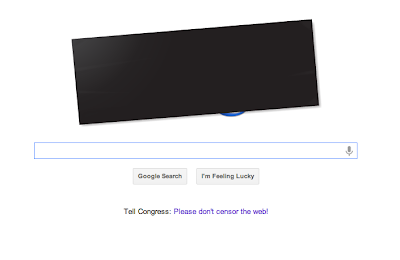Several high-traffic sites were down yesterday, on a kind of a strike in protest of the so-called anti-piracy legislation that was working its way through congress (SOPA in the House, PIPA in the Senate). The momentum of the legislation has significantly slowed, thanks to the counter-lobbying carried on yesterday by users of the internet, and people who produce some of the content that ends up on the web. Up until yesterday, apparently, the voices being heard by Congress were primarily those of publishers and other people who profit from the content of the internet.
At any rate, it was something I was curious about–to what extent would the website strikes actually affect the everyday lives of people who use the internet? So I sent out an email, I blogged, and tweeted. I got the most responses via email, from people I know face to face (my collaborators in the V&R project would have something to say about that, I’ll bet). For the most part, there was very little impact–I heard back primarily from faculty, who said that they could, for the most part, do the things they’d intended to do online yesterday. Those things included using their university email, Google, Google Scholar, and Google Books, Twitter, and university library websites and databases. A couple of professors occasionally use Wikipedia to help clarify terms for their lecture prep, and they had to google for alternate sources. A couple of colleagues were stymied in non-academic activities by the lack of Craigslist and Wikipedia, but for the most part, the academic work of the experts in their respective fields was relatively uninterrupted.
One faculty member reported that her graduate students who rely on Wikipedia for clarification of technical terms were suffering a bit yesterday. The most suffering probably was experienced by undergraduates and high school students, if this twitter stream is any indication.
But many people took time out of their day yesterday to call their legislators in protest against SOPA/PIPA. Even though sites like Google were up, they included links to information and petition sites. I initially wondered what the impact of the strike might have been if Google had shut down, or Twitter, or (*gasp*) Facebook. Why not really take things down, scare the hell out of people, make them feel what they’d be missing where it would be really obvious (in a way that copyright concerns seldom are in everyday life)?
Here’s what I think: the content that flooded Twitter, Google, and FB yesterday was largely about SOPA, PIPA, what was at stake, and how to fight it. If those sites had also been down, a powerful platform for activism would also have been unavailable. I don’t know if this was by design, but leaving the big SMS and Google up was a really effective way to both show a little bit of what the internet would be like under the proposed legislation, and to really flex the internet’s ability to facilitate activism on a grand scale.
For now, it looks like it worked.
